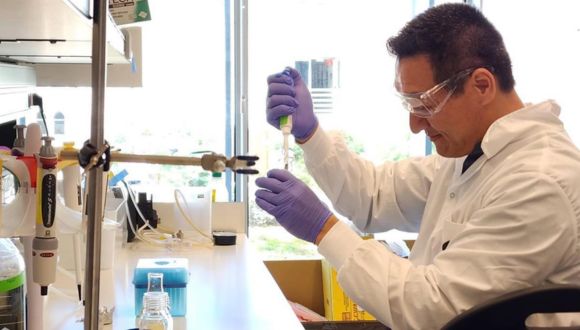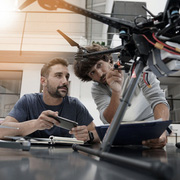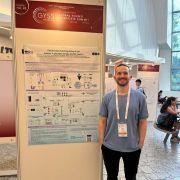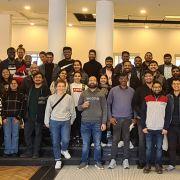Bridging Borders and Research Collaborations
Life as a Fulbright Postdoctoral Fellow at Tel Aviv University
Countless scholars have worked between the United States and other countries thanks to the Fulbright Program, which stands as a beacon of international educational exchange, fostering mutual understanding between people of the United States and other nations through educational and cultural exchanges.
Among the many Fulbright initiatives, Fulbright Israel holds a significant place, facilitating academic and cultural exchange between the United States and Israel. Each year, Tel Aviv University (TAU) is proud to host a number of Fulbright senior scholars, as well as Fulbright fellows. Below are the stories of two postdoctoral scholars who joined TAU thanks to the Fulbright Israel program.
Investigating a Cellular Postal System: Postdoctoral Fellow Nicholas Rogers
As Dr. Nicholas Rogers was finishing up his PhD at Duke University, he began thinking about his next steps. He had remembered meeting Dr. Ines Zucker, from TAU’s School of Mechanical Engineering, at a Gordon Research Conference and recalled that their work overlapped heavily – he decided to reach out to her about the possibility of collaborating for his postdoc.
“At the time, Israel wasn’t really on my radar and the Fulbright wasn’t really on my radar,” recalls Rogers. “But meeting Ines and talking with her and seeing her lab and hearing how she talked about her research and the energy she had – it was an easy sell to want to join her lab group.”
And, so, with a project idea in hand, Rogers made the decision to apply for a Fulbright Israel Postdoctoral Fellowship and won funding to work at Zucker’s lab and at TAU.

Rogers in the lab, working on his research.
Rogers works with extracellular vesicles. As Rogers describes it, these vesicles are like “little packages” that organisms send to one another, which can contain all sorts of information, including genetic materials and nutrients.
“You can kind of think of vesicles as letters in the mail that are being sent between cells or different organisms. We want to know how far the letters go, how they get damaged, what the letters are saying.”
For his PhD work, Rogers focused on how organic extracellular vesicles from bacterial cells travel through an environment similar to an agricultural system. For his postdoctoral work with Zucker, Rogers decided he would explore how less than ideal conditions in an environment – and particularly the introduction of microplastics – might affect the travel of these letter-like vesicles: “With the introduction of plastic materials, would they attach themselves to these letters? Would they break the letters? Or would they be totally inert to them?”
As Rogers dove into his work, he realized that he needed to gather some additional new data. While some delays to the project arose, Rogers says he regardless always appreciated the type of group that Zucker fostered.
“Ines’s spectacular at creating a lab group culture.”
“While I was the only international student in our lab group, I always felt really included. We always had weekly hummus lunches together and things like that,” reflects Rogers.
Moreover, it was his time in Zucker’s lab that made him realize how much he appreciates taking on a mentorship role: “Other than Ines and our lab manager Yinon, I was the most senior person in the lab, and so being able to mentor some of the master’s students and undergraduates that were in the lab … I really enjoyed that,” says Rogers.
“Ines really encourages people to collaborate and to find where your projects overlap.”
Currently, Rogers is finalizing a publication related to his postdoc project, and is back in the United States, interviewing for jobs and planning his next steps.
Optimization in the Face of Uncertainty: Postdoctoral Fellow Roie Levin
Dr. Roie Levin is another Fulbright Israel recipient who recently finished his tenure at TAU; he received a postdoctoral fellowship to work with Prof. Niv Buchbinder in TAU’s School of Mathematical Sciences. For Levin, the decision to apply for a Fulbright fellowship and to TAU was an easy one.

Dr. Roie Levin
Levin is a dual Israeli-American citizen, who spent a lot of time growing up in Israel. Moreover, while he completed his PhD work in algorithms, combinatorics and optimization at Carnegie Mellon University, he says most of the top people in his field are actually Israeli.
“I kind of accidentally picked a field that is extremely Israeli.”
“I found I was always citing the same few authors and that for every paper of theirs, there was a cool idea that I liked; so I thought, you know what, I’ll reach out to them and see if I can work with them,” says Levin.
Levin connected with Seffi Naor at the Technion, as well as Buchbinder at TAU, and before he knew it and thanks to Fulbright, he was stationed at TAU for his postdoc. Levin’s work is very much rooted in computer science theory, and specifically an area called optimization under uncertainty.
To illustrate, Levin compares his PhD work to that of a municipal planner building cell towers.
It would make sense to optimize a municipality’s tower network by determining how to give the best coverage with the least amount of towers; to achieve this, one would want to account for not only the municipality’s current population, but how the population might grow into the future. In a similar way, Levin is focused on building algorithms with near-optimal approximations that at the same time remain robust to uncertainty.

For his postdoctoral work under Buchbinder, Levin said he focused more on what happens when the inputs to a problem keep changing over time. To return to the cell tower analogy, it would be similar to asking whether it might be worth tearing some cell towers down and rebuilding them in different places to optimize a network, even if the initial tearing down of towers might initially be cost or work-intensive.
“I wanted to understand broadly what is the trade-off between moving my solution and jiggling it over time to adapt to new data, and the quality of the solution.”
During his postdoc, Levin also says he really enjoyed working with Buchbinder; the two wrote a paper that was accepted to the top conference in their field, and Levin was also impressed by the creativity Buchbinder more generally took with his work:
“He’s not afraid to throw spaghetti at the wall and I think that’s the mark of a great researcher, that he is willing to be bold and is not afraid to try something unsafe and that’s how great ideas come about.”
Most recently, Levin was able to move to an assistant professor position at Rutgers University directly from his postdoctoral fellowship. “Basically, the transition to tenure-track faculty position was weirdly kind of seamless for me,” confesses Levin.
“I applied and got the job, thanks to the mentors in my life.”
As for the future, he hopes to continue to maintain the research momentum that he had during his PhD and postdoc. “I’m very open and excited as I move into a senior role … and I’m just grateful for everybody in the process that helped me get to this place.”





